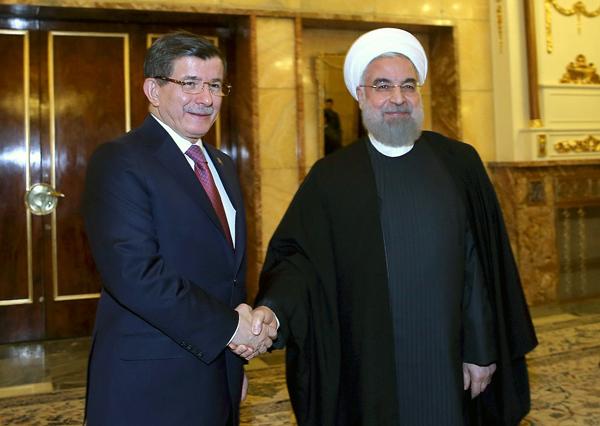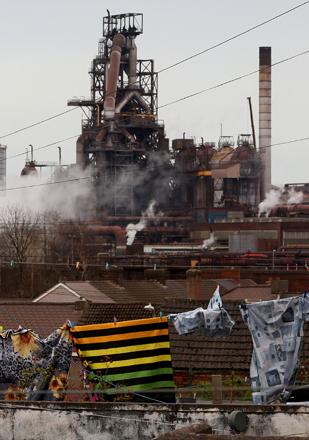You are here
Turkish businesses see opportunity, and competition, as Iran opens up
By Reuters - Feb 03,2016 - Last updated at Feb 03,2016
ISTANBUL — The lifting of sanctions against Iran may be a mixed blessing for Turkey, opening up access to a fast-growing, lucrative market, but one that could someday rival Ankara as both an investment destination and exporter.
NATO-member Turkey remains the region's economic powerhouse, with output of nearly $800 billion in 2014, well above Iran's $425 billion, and an advanced manufacturing industry that exports televisions, cars and washing machines to Europe.
But Iran, with a similar-sized population, could close that gap, Turkish business leaders say, thanks to government incentives, a well-educated workforce, and vast oil reserves that obviate the need for energy imports.
"It is an economy with great potential," said businessman Alper Kanca, whose company, Kanca Dovme Celik, produced engine parts for Iranian automakers for 20 years prior to the sanctions.
"There is extraordinary support from the Iranian government to expand domestic industry," he added.
After the lifting of international sanctions last month, Iran is now the biggest economy to rejoin the global trading system since the Soviet Union broke up more than two decades ago.
Iranian President Hassan Rouhani says Tehran needs as much as $50 billion a year in foreign investment to meet an economic growth target of 8 per cent. So far, deals worth at least $37 billion have been announced in industries ranging from construction to aviation and auto manufacturing.
In the short term, Turkey's auto industry, which accounted for $22 billion in exports last year, could be a beneficiary, thanks to its advanced manufacturing techniques.
"After working closely with European producers for years, Turkish auto parts producers have an upper hand," indicated Mehmet Dudaroglu, the chairman of the Turkish auto parts manufacturing association (TAYSAD).
"However, Tehran's potential incentives for the industry, as well as lower costs, could make Iran the new competition," he said.
Not a rival
The International Monetary Fund expects Iran's economy to expand 4.3 per cent this year, with growth at or above 4 per cent in the next two years. It also sees Iran's imports expanding 18 per cent this year, 14 per cent next year and 7 per cent the year after.
"Turkey will be one of the countries that benefits the most" from the opening of Iran, Economy Minister Mustafa Elitas told Reuters in an interview in Chile on Monday, while on a visit to Latin America.
Turkey's trade with Iran reached $22 billion in 2012, he indicated, before dropping off sharply in subsequent years as tighter sanctions hit. Ankara aims to reach $30 billion in trade with Iran by 2023, he said.
Elitas added that Iran won't be able to draw as much foreign investment as Turkey because it is less democratic.
"Turkey is the most democratic country in the region and foreign investments will go to democratic nations, to countries that can guarantee those investments," he elaborated. "If Iran advances with its economy, then they could become a rival."
Turkey attracted more than $12 billion in foreign direct investment in 2014, while Iran garnered $2 billion.
Some Turkish steel producers take a less sanguine view of Iran, pointing to its immense oil reserves. Turkey is forced to import almost all of its energy needs.
"The steel industries of both countries are based on nearly the same product range. The Iranians have the potential to export some of what they produce and could compete with Turkish steel," said Namik Ekinci, the head of the Turkish Steel Exporters Association. Steel accounted for 7 per cent of Turkey's total exports last year.
Cement producers are also wary.
"The input with the highest cost is energy. And energy is cheap in Iran," said a senior officer at a major Turkish cement producer. "There's tough competition ahead."
Related Articles
ISTANBUL/DUBAI — Turkey and Iran, two countries on opposite sides of Syria's civil war, agreed they must cooperate to end sectarian strife,
ISTANBUL — China's electric vehicle (EV) giant BYD on Monday signed an agreement with Turkey to open a plant in the country in a move that w
MANILA/LONDON — Steel producers in high-cost countries say their best hope for surviving the global glut is to develop higher value speciali















